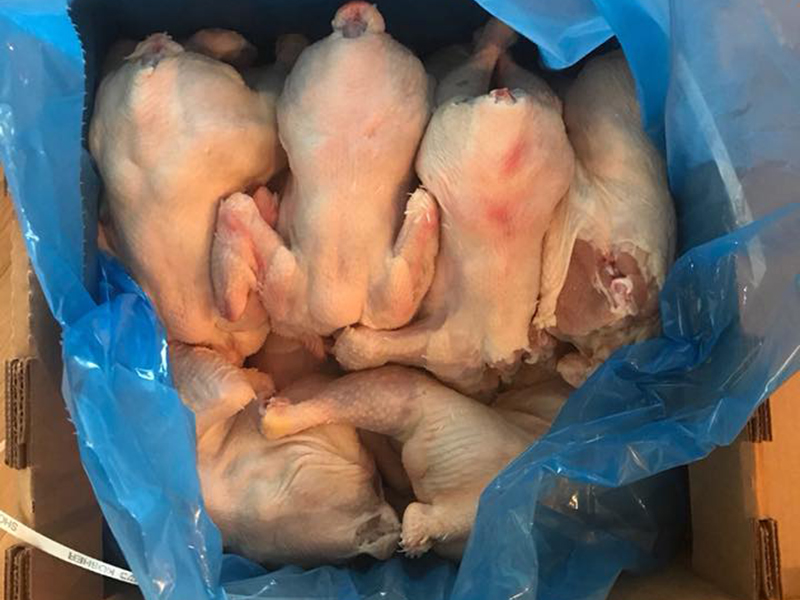It wasn’t exactly the kind of product launch that consumers – and, for that matter, retailers – were expecting. Almost two years after receiving government approval to supply Ontario-sourced kosher chickens, Premier Kosher introduced its free-range birds in 50-pound boxes that were shipped directly to customers, bypassing retailers entirely – at least for now.
The move came only a few weeks after Premier Kosher received final government approval for its production plant in Abingdon, Ont., and only a few weeks before the Passover season, the busiest time of year for kosher food retailers.
The company announced on its website that it would start selling directly to consumers and word spread quickly through social media and word of mouth.
On March 21, a steady stream of people showed up at the parking lot of the Beth Avraham Yoseph of Toronto (BAYT) synagogue in Thornhill, Ont., where Paul Tzellos, the principal behind Premier Kosher, sold boxes of chicken for $2 a pound to eager customers.
Consumers discussed the new kosher birds on the Speedy Meaty…T.O.’s Kosher Guru Facebook page, with comments ranging from approval of the quality and taste of the birds, to people complaining about the fact that the product had to be purchased in bulk, something that many families were unable to do because of storage limitations.
READ: ONT. KOSHER CHICKEN PRODUCTION REMAINS MIRED IN RED TAPE
This marks the first time that Ontario-produced kosher chickens have been available since Chai Poultry sold its quota to a halal producer in 2013. Since that time, Ontarians have been purchasing kosher chickens from a Quebec-based company called Marvid.
However, consumers often voiced complaints on online kosher food groups about the quality and availability of Marvid chickens.
After lobbying from Jewish community groups, Chicken Farmers of Ontario (CFO), a producers’ group that regulates the provincial poultry quota under the authority from the Ontario Ministry of Agriculture, opened up a bidding process for a new kosher chicken producer. A little more than two years ago, Premier Kosher was granted the right to produce kosher chickens in Ontario.
The introduction of kosher chickens has been highly anticipated since that time, but The CJN has learned that some retailers and caterers are unhappy with the way the product was rolled out.
One person close to the industry, who requested anonymity, said the fact that Premier Kosher appeared to bypass retailers during the busiest time of year, without providing an adequate explanation, caught them off guard.

“All the suppliers, all the retail shops, everybody is very upset. You’re coming and selling a product direct to consumers, rather than through the shops, two weeks before Passover. It’s not particularly pleasant,” the person said.
Adding to the intrigue around the introduction of the new product was the fact that kosher supervision for Premier Kosher was being provided by Agudas Shomrei Hadas. When Premier Kosher put in its bid for the chicken quota, it stated that its kosher supervision was going to be provided by the Kashrut Council of Canada, which is more commonly known as COR.
Agudas Shomrei Hadas is led by three prominent Orthodox rabbis in Toronto: Rabbi Mordechai Ochs, a member of the Beis Din (rabbinic court) of the Orthodox Vaad Harabonim; Rabbi Dovid Schochet, president of the Toronto Rabbinical Council and a member of Vaad Rabbonei Lubavitch; and Rabbi Moshe Lowy of Agudat Yisrael, who’s also a judge in the Toronto Beis Din.
Philip Davidovits, a spokesman for Agudas Shomrei Hadas, said the organization has been helping Tzellos prepare his plant for the past year.
Agudas Shomrei Hadas has been providing kashrut certification in Canada since 1946 and “we do the kosher milk,” he said.
The price is good and Marvid kind of sucks.
– Danielle Morris
Tzellos told The CJN that when he looked to COR to provide kashrut supervision, “nothing was guaranteed.” He lauded COR’s help in getting the plant up and running and said that, “They’re supporting us in getting our product into their stores.”
Tzellos said the plant’s opening was delayed due to the need to “get all approvals from all government branches, construction delays.” In addition, “Custom-built equipment was slow in arriving and it takes time to commission things.”
Once the plant is at full capacity, it will be able to produce 50,000 birds per week. Currently, it’s in “start-up mode,” operating at less than 10 per cent capacity. “We’re still learning the business,” he said.
Right now, Premier Kosher is selling direct to consumers at a “one-time” introductory price. “We put a product out to make people aware of our product,” he said, noting that the response has been good.
Tzellos said he plans to ramp up production after Passover, but it could take a year or more for the plant to operate at full capacity.
“We’re taking everything very slow. We’re trying to get the service and quality right,” he said.

Tzellos said consumers can expect to see the chickens in some smaller kosher shops in the near future. He has also been in touch with bigger retail outlets, but said that he is “not prepared to release any information” about those talks at the moment.
Richard Rabkin, the managing director or COR, noted that the organization’s involvement in finding a new producer of kosher chickens in Ontario dates back to the immediate aftermath of Chai Poultry, when it began lobbying government to approve a new producer.
“We worked closely with many of the candidates and provided a letter of support to Paul Tzellos, the president of Premier Kosher, which was a requirement of the CFO, in order to consider his application,” said Rabkin.
He noted that when the CFO chose Premier Kosher to provide kosher chickens, COR was slated to be the company’s kashrut certification agency.
Referring to more recent developments, Rabkin stated, “We received a letter from three rabbis in the Toronto community stating that they are taking personal responsibility for Premier Kosher’s standards.
Chicken is one of the highly kosher sensitive products that have many requirements.
– Richard Rabkin
“As a result, we are currently allowing COR-certified establishments to purchase and sell these products. Of course, chicken is one of the highly kosher sensitive products that have many requirements and consumers are always encouraged to speak to their own rabbi to ensure that products which they consume conform with their own personal standards.”
Maurice Gabay, a spokesman for Marvid, told The CJN that the Quebec-based chicken producer welcomes the competition.
“We are not going to let go of the market without reacting,” he said, pointing to the relationships the company has built with retailers over the years.
Gabay said it is not easy to set up in a new market – there are distribution issues to overcome, permits to acquire and relationships with retailers to establish.
“I have heard there is aggressive pricing” from Premier Kosher, he continued. “If there is a price fight, we are there to react as long as it’s sustainable.”
He said that Premier Kosher’s initial price of $2 a pound is below cost and it would be “suicide” for Marvid to compete at that price point.

Gabay rejected suggestions that some consumers were dissatisfied with Marvid’s product, saying that their customers are happy with it and the company has fielded requests for its chickens from retailers that plan to offer them to non-kosher clientele, as well.
“So far, we are getting even more orders than usual,” he said.
Currently, Marvid is producing 50,000 birds per day for the Canadian and American kosher markets. After satisfying Canadian demand, excess product is shipped to the United States, he said.
If the company loses market share in Toronto, there is a ready market south of the border that’s eager for Marvid’s chickens, he added.
Meanwhile, in the parking lot of the BAYT, a steady stream of people arrived to purchases the chickens from a refrigerated truck.
For Rabbi Josh Stein, the timing of the arrival of the new product, a week before Passover, and the price of $2 per pound, were the main draws.
“With Passover around the corner, it’s an incredible deal. My wife just had a baby,” he said. “It’s perfect timing, with hosting for Passover and Shabbos, it’s like a miracle on wheels.”
Daniel Waserman bought four boxes, each of which contained between 10 and 12 birds, hoping they would taste better than what is currently on the market.
It’s like a miracle on wheels.
– Rabbi Josh Stein
“They’re free-range, which is nice,” he said. “There’s a lack of transparency about what goes into the animals. I have found the taste and texture to be progressively getting more questionable, which leads me here. Hopefully it translates into better taste.”
Danielle Morris was also looking for an alternative to the kosher chickens that are currently being sold by Marvid.
“The price is good … I find (Marvid chickens are) fatty, there’s always lots of skin on the wings and tons of feathers,” she said. “It’s a new business and I’d like to support it.”
With files from Lila Sarick.
